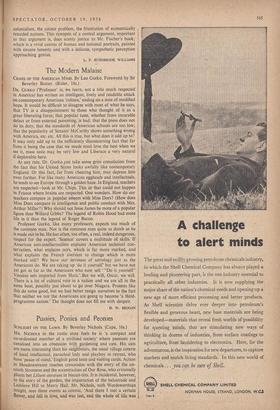The Modern Malaise
CRISIS OF THE AMERICAN MIND. By Leo Gurko. Foreword by Sir Beverley Baxter. (Rider, 18s.) DR. GURKO (Professor' is, we learn, not a title much respected in America) has written an intelligent, lively and readable attack on contemporary American 'culture,' ending on a note of modified hope. It would be difficult to disagree with most of what he says, that TV is a disappointment to those who thought of it as a great liberating force; that popular taste, whether from incurable defect or from external poisoning, is bad; that the press does not do its duty, that the standards of American schools are too low; that the popularity of Senator McCarthy shows something wrong with America, etc. etc. All this is true, but what does it add up to? It may only add up to the sufficiently disconcerting fact that far from it being the case that we needs must love the best when we see it, mass taste may be very low and Liberate a very natural if deplorable hero.
At any rate, Dr. Gurko can take some grim consolation from the fact that his United States looks awfully like contemporary England. Or this fact, far from cheering him, may depress him even further. For like many American eggheads and intellectuals, he tends to see Europe through a golden haze. In England, teachers are respected—look at Mr. Chips. This or that could not happen in France where brains are respected. One wonders. How do our teachers compare in popular esteem with Miss Dors? (How does Miss Dors compare in intelligence and public conduct with Mrs. Arthur Miller?) Why should not Jesse James be more of a popular figure than Willard Gibbs? The legend of Robin Hood had more life in it than the legend of Roger 'Bacon.
Professor Gurko, like many professors, expects too much of the common man. Nor is the common man quite as dumb as he is made out to be. He has often, too often, a real, indeed dangerous, respect for the expert. `Science' covers a multitude of skills. If American anti-intellectualism explains American technical con- servatism, what explains ours, which is far more marked, and What explains the French aversion to change which is more marked still? We have our devotees of astrology just as the Americans do. We are taking up `do it yourself' but we have not Yet got as far as the Americans who now sell ' "Do it yourself" Voodoo sets imported from Haiti.' iBut we will, Oscar, we will. There is a lot of cultural ruin in a nation and we are all in the same boat, possibly just about to go over Niagara. Protests like this do some good, but we had better resign ourselves to the fact that neither we nor the Americans are going to become `a third- programme nation.' The thought does not fill me with despair.
D. W. BROGAN


































 Previous page
Previous page